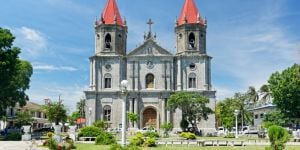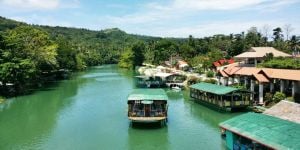
The Philippines stands as an enchanting archipelago boasting a rich cultural heritage, breathtaking landscapes, and warm, hospitable locals. Beyond its allure as a tropical paradise, the country has been steadily gaining recognition as an emerging destination for international students seeking high-quality education. With its diverse academic offerings, world-class institutions, and vibrant student life, the Philippines presents a compelling opportunity for individuals from around the globe to embark on an enriching educational journey.
Higher education in the Philippines is governed by three bodies: the Commission on Higher Education (CHED) for tertiary and higher education, the Department of Education (DepEd) for basic education, and the Technical Education and Skills Development Authority (TESDA) for technical-vocational and mid-level education. As of 2020, there are 112 State Universities and Colleges (SUCs) (excluding its 421 satellite campuses), 121 Local Colleges and Universities (LUCs), 13 "Other Government Schools" (OGSs), and 1,729 Private Higher Education Institutions in the Philippines.
Tuition fees in the Philippines vary depending on the number of units chosen. As of 2022, the Commission on Higher Education said that the national average rate of increase in tuition per unit is 4.74 percent (P29.15). The national average rate for other school fees is 10.61 percent (P50.51).
The higher education system in the Philippines
Every year, the Philippines welcome thousands of international students wishing to pursue their higher studies in English. The Bureau of Immigration data shows over 35,000 international students, mostly in medical courses, were studying in the Philippines before the Covid pandemic. It is expected that these numbers will be replicated and exceeded now that the Philippines borders and higher education institutions have reopened. Note that the country has the whole of Asia's best higher education system, with 40% of faculty staff having a Master's and 13% a Ph.D.
Moreover, registration and course fees in the Philippines are lower than in many countries. You are advised to inquire about these fees with the university you have chosen because, as mentioned, it depends on the number of units you will take.
Universities in the Philippines
A lot of universities are concentrated in what they call the 'University Belt' in Quezon City.
Some of the most prestigious universities in the Philippines are:
University of the Philippines- Diliman
University of the Philippines- Diliman is located in Quezon city, offering graduate and undergraduate programmes, and is a leading light in science and research.
Ateneo de Manila University
Also in Quezon City, Ateneo de Manila University, an institution with Jesuit links, is well known for its excellence in languages, English studies and business studies.
De La Salle University
A Christian Brothers-founded university with a strong Catholic ethos, De La Salle University specializes in business, computer studies, economics, education, engineering, law, liberal arts, and science.
University of the Philippines
With its main campus in Quezon City, this umbrella for all the University of the Philippines campuses ranks in the top 500 universities in the world!
University of Santo Tomas
Another Manila center of excellence is the University of Santo Tomas (UST), which is particularly renowned for leading the way in the medical field, particularly medicine, nursing, pharmacy, medical technology, biology, chemistry and physical therapy.
Polytechnic University of the Philippines
This well-known research coeducational state university in Manila is famous in the fields of banking, business and finance. Polytechnic University of the Philippines is the largest university in the Philippines, with over 70,000 students.
University of Cebu
The University of Cebu, which has the motto of ‘Democratizing Quality Education', continues to achieve high marks in marine and maritime studies and naval architecture.
University of the Philippines Los Baños
The University of the Philippines Los Banos is a state university located in the towns of Los Baños and Bay in the province of Laguna. It is renowned for its agriculture and biotechnology advancements due to its unique work in plant breeding and bioengineering.
General requirements for a foreign applicant who graduated from a high school abroad vary greatly, depending on which university the student is applying to. Check out the university's website and read their foreign admission policies carefully.
Conditions to be met for studying in the Philippines
Note that you are eligible to study in the Philippines if you are at least 18 years old and you have sufficient funds to support yourself during your stay in the country. If you wish to move temporarily to the Philippines to enroll in a university, an academy, a college, or a school, you must seek the authorization of the Commissioner of Immigration.
Therefore, you first have to contact the university or higher education institution where you would like to study since different universities have program-specific requirements (i.e., for law or medicine). But generally, the minimum university admission requirements include the following:
- duly accomplished application form;
- application fee;
- results of the university admission exam;
- letter(s) of recommendation from your recent school;
- five copies of the Student's Personal History Statement (PHS) duly signed, both in English, and your national alphabet, accompanied by your personal seal, if any, and containing, among others, your left and right thumbprints and a 2x2 inch photograph on plain white background taken not more than six months prior to submission;
- notarized affidavit of support, including bank statements or notarized notice of grant for institutional scholars to cover expenses for your accommodation and subsistence, as well as school dues and other incidental expenses;
- Transcript of records/ scholastic records duly authenticated by the Philippine Foreign Service Post located in your country of origin or legal residence; and
- data page of your passport showing the date and place of birth duly authenticated by the Philippine Foreign Service Post.
Some universities in the Philippines also require your authenticated birth certificate, TOEFL/IELTS results for applicants from non-English speaking countries, or a personal statement or a letter of motivation for pursuing further studies. Once you have been given a Notice of Admission by the school, you can proceed further once your application has been approved by the Commission on Higher Education (C HED), the Bureau of Immigration and Deportation (BID) and by the Department of Foreign Affairs at the Philippines embassy or consulate in your home country.
Student visas in the Philippines
You can apply for a student visa in the Philippines if you're at least 18 years old, have sufficient financial resources, and intend to take up a course higher than high school at an institution accredited by the Bureau of Immigration.
Students must directly enroll with the Philippine university or higher education institution they have chosen, which will then submit the application to the Commission on Higher Education (CHED) for approval. If the answer is positive, the CHED will transmit its approval to the Secretary of Foreign Affairs, who will then allow the Consulate to issue the student visa.
Documents to be produced when applying for a student visa, as listed by the BI, are the following:
- Letter request addressed to the Commissioner from the representative of the petitioning school;
- Duly filled and signed CGAF (Consolidated General Application for Immigrant Visa) forms. If the applicant is a minor, it shall be signed by the parent or the legal guardian;
- Photocopy of passport bio-page and latest admission with valid authorized stay;
- Certificate of Acceptance issued by the learning institution accredited by the Bureau of Immigration to accept international students, indicating the number of months (length of study) of the technical/vocational, special and/or primary or secondary level courses for applicants below 18 years of age;
- Photocopy of BI school accreditation ID of the registrar or school representative;
- National Bureau of Investigation (NBI) Clearance, in case of flying schools;
- Bureau of Immigration Clearance Certificate.
Teaching culture in the Philippines
The teaching culture of the Philippines is similar in certain ways to Western countries. Lectures are given primarily through the medium of English language, and student courses are based on a points system.
Where it differs is that Philippine universities are stricter than Western colleges, and students have less autonomy. Students are more respectful to their professors. Also, it is not uncommon for students to wear uniforms to denote their particular subject, for example, criminology.
The teaching language in the Philippines
As mentioned above, English is generally used as the medium of instruction in Philippine universities. The UP Language Policy provides for the development and use of the Filipino language while maintaining English as a global lingua franca. Outside classes, you may hear Tagalog or Visayas spoken amongst the other students, but after a little shyness, the students will communicate with you in English. Alternatively, why not use this opportunity to learn the local language?
The learning environment in the Philippines
Be prepared to wear uniforms if you're going to attend a private sectarian college, and for unchangeable schedules. This means your lectures will be fixed for the year, and there may be full-day classes.
The faculty (body of educators, i.e., professors or teachers) normally have an open door policy and are welcoming and helpful. Your chosen university should also have a dedicated International student officer/ department to assist you.
The learning environment in the Philippines is welcoming and warm, and there is a generally familiar feeling where all students genuinely want to gain the best marks possible and to also learn from you as an international student.
Working part-time as an International student in the Philippines
International students cannot partake in part-time work in the Philippines as this is not part of the special student visa. In fact, this is frowned upon by Philippine universities and the Philippine Department of Labor and Employment, as full attention should be paid to this international learning experience. However, in rare situations, a Special Work Permit (SWP) can be granted to international students. This work permit would allow international students to have short-term employment or work-related projects in the Philippines for up to 6 months.
Student accommodation in the Philippines
Your university will have student accommodation attached to the University or nearby. These ‘dorms' will be safer, communal and will have a university feel that will help you feel safe. Do not hesitate to contact your International student officer for more information about student accommodation in the Philippines. If, however, you choose to live independently in the Philippines, and it is permitted by the University, read our article about Accommodation in the Philippines to get an idea of the different types of accommodation available, rent prices you should expect, etc.
Health insurance for students in the Philippines
Remember to inquire whether your university insurance will provide coverage during your studies in the Philippines. Otherwise, you will have to subscribe to additional health insurance.
We do our best to provide accurate and up to date information. However, if you have noticed any inaccuracies in this article, please let us know in the comments section below.








